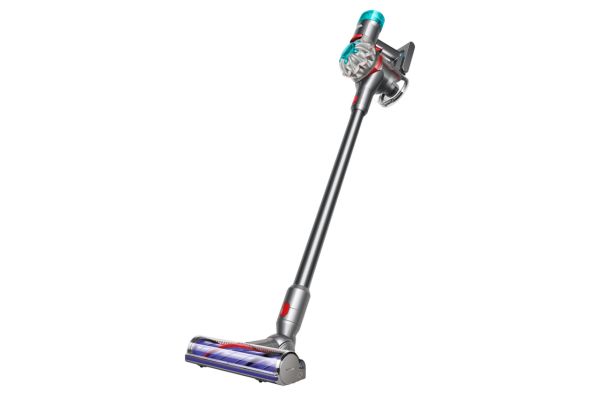Central Vacuum is a built-in house vacuuming system that cleans larger areas, whereas Dyson is a regular vacuum brand best for residential apartments. Central vacuum system installation is a complex process, but it lasts longer and cleans efficiently. For optimal cleaning, central vacuums can be compatible with brushes, crevice tools, upholstery tools, and floor brushes. Using these attachments, you can clean carpets, floors, upholstery, stairs, ceilings, garages, and workshops. Despite its cleaning benefits, a central vacuum has its setbacks, where regular vacuums like Dyson upbeats such built-in systems.
Dyson is one of the prominent vacuum brands, boasting powerful suction, effective filtration, and multiple surface cleaning capacity. Despite the significant differences between a central vacuum system and a regular vacuum like Dyson, each has a potential cleaning capacity. If you need to invest in one vacuum, either a central vacuum or a Dyson, this comprehensive article can lead to take the right decision.
Table of Contents
Central Vacuum Vs Dyson
Central Vacuum Review

A central vacuum system functions based on a motorized power unit. The central unit is connected to multiple retractable vacuum hoses, a collection canister for accumulated dirt, and a series of inlet valves. Each hose is installed in different rooms in the house where you can store and pull out for vacuuming. You can easily connect the hose with an inlet valve, pull the hose, turn on the power, and start vacuuming.
Central vacuum systems are designed to keep the motor and canister static, so you don’t need to move the canister. Instead, you might need to lug the long hose from inlet to inlet for efficient cleaning. A central vacuum system can deep clean carpets and rugs with its powerful suction capacity. Besides, this built-in vacuum system is compatible with surface-specific attachments such as bare floor brush, crevice tool, upholstery tool, extension wands, etc. Using these attachments, you can easily clean different floors, carpets, sofas, couches, stairs, ceilings, and other surfaces. The main drawbacks of a central vacuum system are its lack of portability and higher upfront costs, which might fall short for many users.
Advantage and Disadvantage
A central vacuum system has many benefits over regular portable vacuums. At the same time, the system has its own setbacks that you should consider before proceeding to install it in your house. Let’s scroll down the advantages and disadvantages of a centralized vacuum system:
Advantages
- Central vacuum cleaners offer significantly more powerful suction than regular vacuums.
- Most CVSs have efficient filtration systems that trap more dust, debris, and other allergens, like pet dander, and improve the air quality of your living area.
- A CVS comprises a larger dust collection capacity, so there is no need to lug the canister from room to room.
- The motors of central vacuum cleaners are installed in a remote area like the basement, so noise won’t create any problems.
- A built-in central vacuum cleaner can last up to 10 to 20 years (if well-maintained). Such duration is longer than most portable vacuums.
Disadvantage
- Require higher upfront investment, more (as much as $2,000) than a traditional portable vacuum.
- Maintenance and repairs of a central vacuum can be a hassle and time-consuming.
- The motor of the central vacuum system occupies significantly more space
- A CVS motor and hose take more storage space than a portable vacuum cleaner.
Dyson Review

Dyson is a UK-based vacuum manufacturer that offers a diverse range of efficient and futuristic cleaners intended to achieve your desired cleaning result. Dyson is reputed for producing premium, high-quality, and durable vacuums that can typically last for approximately 5 to 10 years in appropriate hands!
This high-end vacuum manufacturer sells top-notch corded/upright, cordless, wet and dry, and advanced robot vacuums. Due to superior design, robust construction, advanced features, and powerful suction, Dyson vacuums hold a pricier spot among regular household vacuums. One thing we love about the Dyson brand is that it offers various cleaning attachments such as crevice tools, advanced cleaning heads, brush tools, and pet-special tools with each vacuum to maximize spotless cleaning. That’s why Dyson is widely admired in the realm of regular vacuum cleaners.
Advantages and Disadvantages of Dyson Vacuum Cleaners
Advantages:
- Dyson vacuums are less costly than central vacuum
- Dyson vacuums are best for apartment residents
- Dyson vacuums are designed with advanced technology
- Many Dyson vacuums have a longer run time and cord length
- Maximum Dyson vacuums are bagless, which is cost-effective
- Dyson vacuums are portable and easy to use
- Dyson’s effective filtration system contributes to improved air quality
- Dyson vacuums include more cleaning attachments
Disadvantages:
- Dyson’s suction power is lower than central vacuums
- Dyson vacuums can be heavier
- Dyson vacuums are louder compared to central vacuums
Central Vacuum Vs Dyson: Similarities
Ease Of Cleaning
Central vacuums are packed with easy-to-use functionalities. The vacuum system is popular for its powerful suction, which effectively cleans the residence. All you need to do to operate the system is just plug it into the power outlet and vacuum.
Dyson vacuums are also easy to use with a different approach to vacuuming. Like other regular vacuums, it’s portable, easy to operate, and clean. Bagged vacuums call for replacement when the dust bag is full, whereas Dyson offers convenient bagless options, boasting a reusable dust cup that is easy to clean.

Effective Filtration
You might need to vacuum a larger area, keeping your respiratory problem aside. Central vacuum cleaners can tackle larger areas by trapping all the dust and allergens inside. The efficient cleaning ensures improved air quality and helps you to restore a spotless surface.
From smaller to larger apartments, Dyson vacuum can trap microparticles, like pet hair, soil grain, and heavy particles like rice, cereals, pet food, etc, by its effective filtration system. While vacuuming, Dyson never triggers your allergy or asthma, and at the same time, it will ensure an improved living environment.
Can Tackle Wet and Dry Messes
Although the functional process of the central vacuum and Dyson vacuum is different, both vacuum cleaners are capable of cleaning wet and dry dirt from different surfaces.
Central Vacuum Vs Dyson: Dissimilarities
Portability
A central vacuum is installed during the construction of a house, and this centralized system is not portable. However, a central vacuum has an above-average larger hose that has approximately 40 ft of cleaning reach.
On the other hand, a regular vacuum like Dyson is portable from one room to another, one floor to another. Whether the Dyson model is corded or cordless, you can conveniently move the vacuum from different places.
Winner: Dyson wins the portability section as the Central vacuum’s canister and motor remain static. Only the hose is movable.
Installation
Central vacuum system requires a complex installation process that involves expensive professional service. In return, you’ll get a long-term vacuuming solution. A central vacuum can last up to 20 years, which is significantly higher than regular vacuums.
Regular vacuum like the Dyson doesn’t need any installation. Rather, you might need to assemble its parts and attachments. After assembling and properly using, robust Dyson vacuums can last up to 10 years.
Winner: Technically, Dyson is easier to assemble and requires no built-in installation process to operate. In addition, Dyson also last longer than other regular vacuum cleaners.
Cleaning Power
In general, central vacuum cleaners are more powerful than regular vacuum cleaners. Central vacuum cleaners are designed with powerful motors that have approximately 600-800 air watts to clean 2500-6000 sq. ft. area. With powerful suction, the system can remove more dirt and debris faster. Their filters also last longer and have a larger dust collection capacity. So, you may not need frequent replacements or cleaning like regular vacs.
Dyson vacuums have approximately more than 250 air watts to clean residential apartments (average size 822 sq. ft.), which is significantly lower than central vacuums. However, Dyson machines tend to have more features, including adjustable suction, LED display, and rotating brush head, and are generally more comfortable to use. Dyson vacuum cleaners also have advanced filters, which are designed to trap pollutants and allergens from the air so that the air dust doesn’t trigger your respiratory issues.
Winner: Central vacuum system has better suction power than Dyson vacuums.
Maintenance
Central vacuums don’t need frequent maintenance, but the maintenance process can take a complex route. On the other hand, Dyson vacuums require regular maintenance, such as filter and dust cup cleaning. You can easily maintain Dyson vacuums within a few minutes by following the care instructions properly.
Winner: Dyson vacuums are easier to maintain than central vacuum systems.
Noise Level
The motor of a central vacuum system is usually located in the basement or garage store. As a result, no annoying sound is audible at home while vacuuming with a centralized system. Typically, a central vacuum system emits approximately 60-80 dB noise.
On the other hand, Dyson vacuums are comparatively louder than other regular vacuums, ranging from approximately 65-85 dB noise level.
Winner: Central vacuums are quieter than Dyson vacuums.
Cost
The central vacuum system is installed during house construction and requires professionals’ involvement. So the approximate cost ranges between $800-$2000.
On the other hand, Dyson vacuums are less costly than central vacuum systems. There is no need for professional service to operate Dyson. Dyson’s price range varies from $200 to $700.
See Also: How Much Does A Vacuum Cost
Who Should Choose Central Vacuum System?
If you want to set up a centralized vacuuming system for your residence, then a central vacuum is the only option to choose. You must install a central vacuum system during the construction of a larger residential or commercial establishment. It might be similar to the way water pipelines are installed inside the walls across your home.
Who Should Choose A Dyson Vacuum Cleaner?
For those who live in residential apartments and need to vacuum regularly, Dyson vacuums would be the best fit. With a Dyson vacuum, you can frequently move from room to room and go upstairs. With a Dyson vacuum, you can clean small to larger areas conveniently.
Final Words
Central vacuum and Dyson vacuum- both have their unique functionalities. Central vacuums have higher upfront costs and longer lifespans, whereas Dyson vacuums are less costly than a centralized system and have a standard shelf life. If you’re about to build a new home, then you have a scope to install a central vacuum system. Otherwise, a regular vacuum like Dyson can be a sustaining solution to keep your living area spotless.

